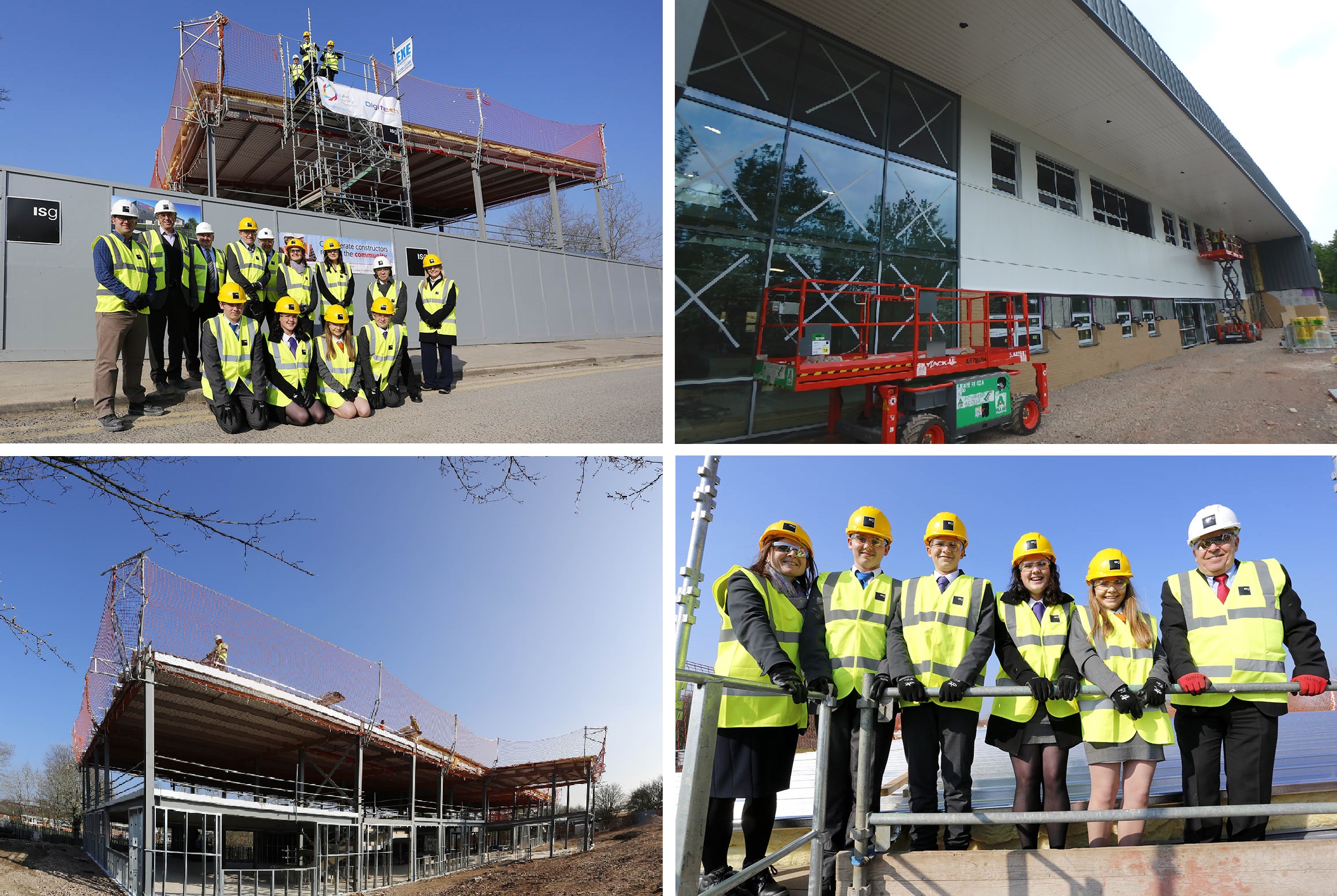ISG Construction’s Digitech Studio School project achieves exceptional scores with the Scheme
Digitech Studio School is an EFA (Education Funding Academy) financed project to provide a new teaching facility for The Cabot Learning Federation in Warmley near Kingswood in Bristol. This specialist STEM (Science, Technology, Engineering and Mathematics) school will cater for young people aged from 14 to 19.
Outlining the project, Chris Bartlett, Project Manager, ISG Construction South West said:
“The school will enhance the curriculum offered to students in South Gloucestershire, improving their employability skills to prepare them for careers in the growth of high tech and creative digital sectors. The initial phase of the project involved the demolition of a redundant teaching block to pave the way for construction of the new school.
“The new facility encompasses approximately 2000 square metres, over two floors, with a range of teaching facilities that include workshops, media studios, science laboratories and general teaching spaces. In addition, there is a library, cafe and small theatre. The project build duration is 46 weeks with a handover scheduled for early October. The school will be decanting from the existing facility and occupying the new premises during the autumn half term period.”
Explaining how the project team incorporated the requirements of the Scheme into its working practices, Chris said:
“An initial assessment of the project was made following registration with the Scheme and a CCS Plan developed to highlight areas of best practice which would need to be incorporated within the project. Following registration, the actions arising from the plan were assigned to staff and the project team for implementation.
“The Scheme has undoubtedly improved the image of construction since its inception, in particular in relation to the image of small to medium sized contractors. Registering with the Scheme is an easy and effective method of demonstrating a commitment to continual improvement.”
One of the challenges encountered by the project team during the work was the location of the site which was within the confines of a secure school campus, incorporating two secondary schools, a pre-school nursery, leisure centre with outside sports fields and a catering company.
At the entrance to the campus on Tower Road North is the Warmley Park School which caters for children aged from 3 to 19 with severe learning difficulties. The challenges were to ensure that construction-related activities did not disrupt the day-to-day running of the campus, or inconvenience students, staff, parents and visitors, while maintaining the construction programme within the set targets.
You can find out how the team addressed these challenges, as well as reading about just a few of the many examples of best practice implemented by ISG Construction South West by clicking on the sliders below:
- The team developed an interactive app and direct link to Twitter feeds for the site. The app contains a video introduction to the project delivered by the school Principal and provides essential site information, information on delivery times, restrictions and site activities, as well as direct links to the school and ISG websites. See the app by clicking here.
- The site gave an excellent first impression, with all signage consistent and in appropriate locations. Enclosures on site and the entrance were visually appropriate to their surroundings and did not have graffiti issues.
- All facilities, including stored materials, vehicles and plant were managed through a specific ISGCSW (ISG Construction South West) system.
- ISGCSW had a programme to ensure that the workforce was suitably dressed both on and off site, with PPE and branding consistent with ISGCSW company values and the introduction of a ‘Rights To Work’ initiative.
- ISGCSW had a programme of site visits by line managers and directors to ensure the site portrayed a positive image, with visits highlighting company processes, systems and vandalism control.
- ISGCSW ensured that critical issues such as site facilities, boundaries and compound areas were suitably managed and maintained by the site team via use of an ISGCSW system and ISO 90001 audited checklists.
- ISGCSW published its corporate values and highlighted its overall identity on its posters, through site rules and through the various modes of communications it employed to promote a positive industry image.
- ISGCSW made use of QR c odes in its overall marketing and communications activities, enabling users to access the site-specific App and Twitter feed.
- The project team engaged the school, students, staff and parents in the design and creation of the School Travel Plan which was required for submission to the planners for discharge prior to occupation. It was felt that by engaging students in this manner they would develop a feeling of ownership and pride in the new development.
- To overcome the challenges of working in close proximity with the adjoining schools, the site team fostered a culture of close collaboration by promoting regular educational site visits for students. They also held regular weekly meetings with staff and stakeholders; actions arising from the meetings were then implemented and managed by the team.
- The project team also undertook goodwill activities which included undertaking surveys and replacing defective windows in some of the surrounding existing campus buildings.
- The company also encouraged operatives to use the local shops and businesses as appropriate, as well as using local labour wherever possible (100% at the time of the second Monitor’s visit), and all in a manner that portrayed a positive image of the site.
- The company had a formal CSR policy of community engagement, highlighting close interaction with all of the campus schools and conducted nine school visits involving approximately 100 students.
- There were two work experience placements onsite from Digitech School and two apprentices with the local carpentry contractor.
- Over 200 students had visited the project since its inception with events including an Open Day for Parents.
- As part of the site’s goodwill activities, it was helping to maintain the existing school facilities at no cost to the community, as well as relocating public pathway fencing.
- The site also contributed free hanging basket planters to schools and nearby residents.
- The company environmental policy was displayed and used a site-specific and audited SEMP (Site Environmental Management Plan). This included company-specific KPIs which were applied throughout the site team and its supply chain.
- ISGCSW developed appropriate investigations, methodologies and accreditations (including ISO140001) for important environmental issues related to site operations.
- The site used the SmartWaste system and set specific waste reduction targets, with waste segregated on site. At the time of the second Monitor’s visit, the amount of waste diverted from landfill was running at 91.86% and was moving towards the company target of zero.
- Fauna and flora was appropriately managed and monitored with specific operative training on handling hazardous material where necessary. A range of targeted consumption saving schemes were in place to gauge accommodation, energy, water, GTPs and rainwater harvesting, subject to formal CO2 footprinting and reporting (both internally and externally.) This was part of the company’s strategy for moving towards being carbon neutral as part of its ESOS (Energy Savings Opportunity Scheme) requirements.
- The company exhibited its strong environmental credentials, both on site and to the wider public, via the ISG company website, on-line links and through their App and Twitter feed.
- The site carried out some environmental enhancements of the local area, including the creation of a ‘wild area’ and within the landscape scheme.
- The site was externally audited by the ISGCSW Safety Team every two weeks, as well as encouraging subcontractor external advisor visits and reports, all of which were regularly reviewed.
- The site had an appropriate security system for both operational and out-of-hours periods, and also had a programme to enhance its safety performance, including new initiatives and campaigns as part of the ‘Don’t Walk By’ programmes.
- Management systems relating to the movement of plant and vehicles were all banked and were compliant with FORS/CLOCS regulations to ensure the safety of cyclists on and off site.
- The company had a drugs and alcohol random testing regime in place and the site manager had a record of the number of company sites visited in the previous month and the number of non-negative results recorded, all as part of demonstrating to the workforce how seriously the issue is taken.
- The site continues to comply successfully with safety plans, providing 24-hour static security guards to assist with a school closure reunion event to ensure the security of both the existing and new facilities.
- The site introduced an Emergency Action Kit which was held in the site office and contained additional PPE, response first aid kit, torches, radios and defibrillator. Also contained in the kit was a copy of the Site Emergency Plan with contacts and a detailed procedure.
- Where a CSCS/CPCS or other skill card was recorded as expiring prior to the contract completion date, ISG issued a card expiry warning notice and then booked and arranged for re-registration, retest and card renewal on the operatives’ behalf.
- ISGCSW had a policy of meeting with the operatives on a weekly basis to review all aspects of site operations and to encourage team building in all of its activities, as well as promoting an open door policy.
- The site provided occupational health advice as well as undertaking a free screening day.
- ISGCSW and its subcontractors checked the legality of the workforce at induction and via spot checks.
- The company ensured the appropriate cultural, religious, Quiet Room support and basic educational skills of its workforce.
- ISGCSW and its subcontractors promoted positive campaigns to encourage apprenticeships, work placement students and trainees, as well as providing careers advice. It also offered a range of workforce support activities, including workforce qualifications and e-learning programmes, counselling services, including financial, and rewarding those who contribute to best practice.
- The site provided water coolers in the site and in canteen areas.



